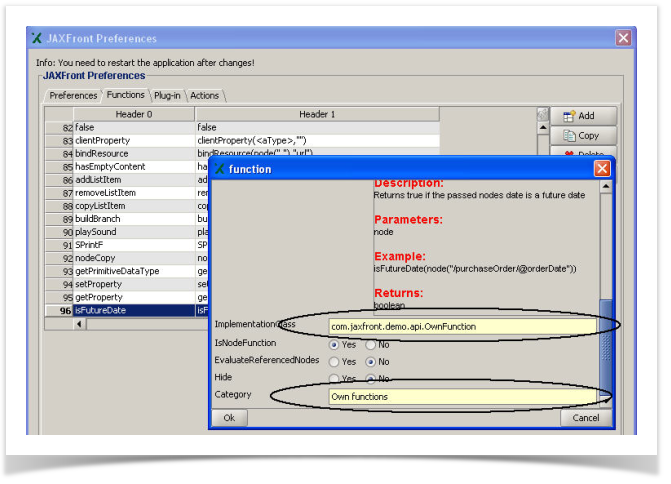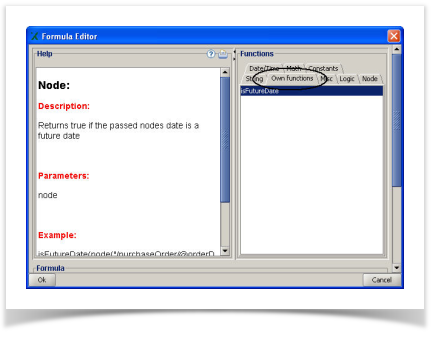A function can be used everywhere within the rule engine (condition expression, nls text). A predefined set of functions already exists.
To register the own function, open the "Preferences" dialog in the XUI Editor ("View" menu) and add a new function. After adding/modifying the functions, the XUI Edtior needs to be closed and started again.
Implementing an own function means to extend the "com.jaxfront.core.jep.JaxfrontMathCommand" class . In the field "Implementation Class" enter the class name which extends this class. In the field "Category" add an existing category name or a new one. You will see all categories when using the formula engine.
The class needs to extend the "com.jaxfront.core.jep.JaxfrontMathCommand" class:
Name | Description |
|---|---|
run(Stack) | Each function should use it's own run() method for evaluating the function. This includes popping off the parameters from the stack, and pushing the result back on the stack. |
| Hinweis |
|---|
| See class com.jaxfront.demo.api.OwnFunction |
This function checks if the passed node values is a future date.
| Codeblock | ||||||
|---|---|---|---|---|---|---|
| ||||||
public class OwnFunction extends SuperTypeNode {
public void run(Stack stack) throws ParseException {
// Check if stack is null
checkStack(stack);
Object param = null;
String xPath = null;
boolean isFutureDate = false;
if (curNumberOfParameters == 1) {
Type baseType = getCommunicator().getRootType();
param = stack.pop();
if (param == NULL._null) {
stack.push(NULL._null);
return;
} else if (param instanceof Type) {
baseType = (Type) param;
} else if (param instanceof String) {
xPath = (String) param;
}
Type resultType = null;
if (xPath != null && xPath.length() > 0) {
resultType =
TypePathExecuter.getInstance().getTypeForXPath(
baseType,
xPath.trim(),
true,
true);
} else
resultType = baseType;
if (resultType != null) {
if (resultType.isSimple()) {
SimpleType simpleType = (SimpleType)resultType;
String dateString = simpleType.getValue();
if (dateString != null) {
try {
SimpleDateFormat format = new SimpleDateFormat("yyyy-MM-dd");
Date inputDate = format.parse(dateString);
Date currentDate = new Date();
isFutureDate = inputDate.compareTo(currentDate) > 0;
}
catch (java.text.ParseException ex) {
//do nothing
}
}
} else {
throw new ParseException(this.getClass() + " Invalid target type (must be simple)");
}
}
if (isFutureDate) {
stack.push(SuperTypeNode.isTrue);
}
else {
stack.push(SuperTypeNode.isFalse);
}
} else {
throw new ParseException(this.getClass() + " Invalid parameter type");
}
}
}
|

